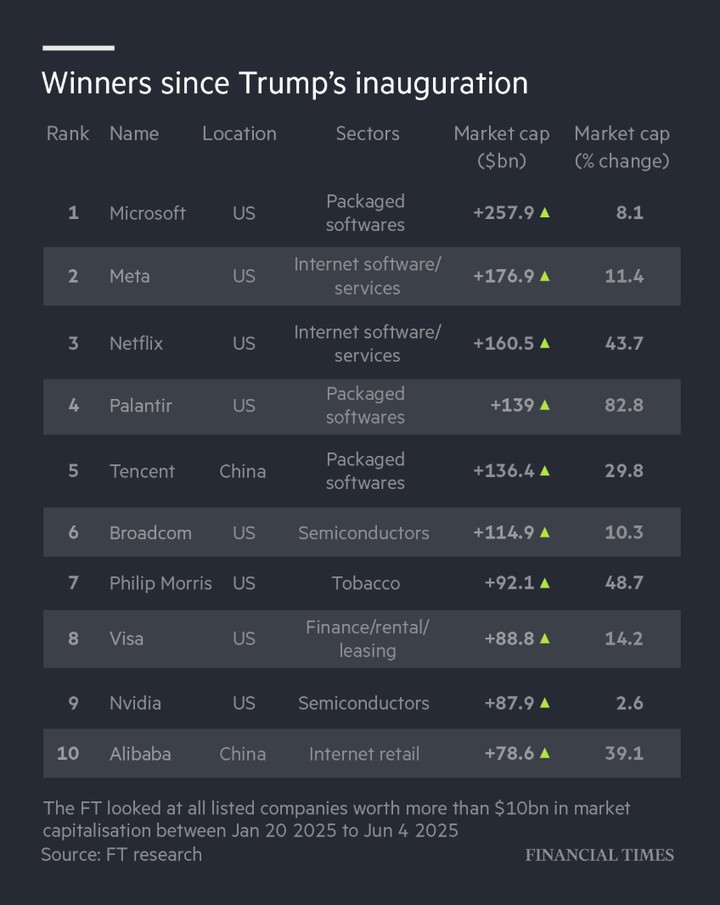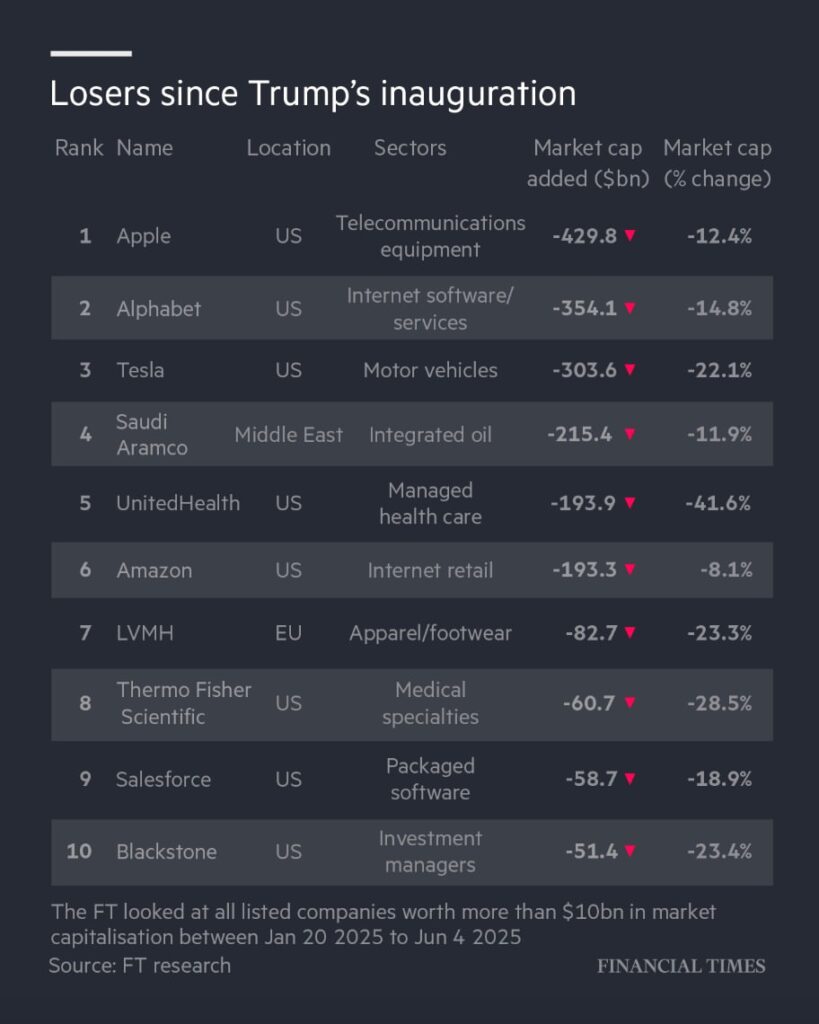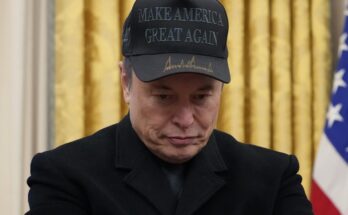
Twenty weeks into President Donald Trump’s ambitious ‘Make America Great Again’ (MAGA) agenda, the stock market landscape has revealed an unexpected twist: many of the biggest winners in the equity markets are companies headquartered outside the United States. This phenomenon has raised eyebrows among investors, policymakers, and economic analysts who initially expected the Trump administration’s policies to chiefly boost domestic firms and American-made industries.
When Trump took office, his economic agenda promised sweeping reforms aimed at revitalizing U.S. manufacturing, deregulating business sectors, cutting taxes, and renegotiating trade deals that he argued disadvantaged American workers. With a strong emphasis on “America First,” the expectation was that U.S. companies would emerge as primary beneficiaries of the administration’s efforts to stimulate the domestic economy. Yet, as the first twenty weeks have unfolded, the stock market tells a more complex story.
Global Winners in a Nationalist Era

The most striking development has been the remarkable performance of multinational corporations and foreign companies with significant global footprints. Despite the administration’s rhetoric emphasizing protectionism and prioritizing domestic interests, foreign firms in sectors such as technology, consumer goods, and energy have posted some of the most impressive stock gains.
For instance, major European technology companies listed on U.S. exchanges have surged due to strong earnings reports and expanding market share, benefiting from both global demand and favorable currency movements. Asian tech giants have similarly experienced upticks, boosted by robust sales in emerging markets and strategic partnerships with American firms.
Energy firms based in Canada and Brazil have also been notable market winners, riding the wave of rising commodity prices and increased demand amid geopolitical tensions. These companies have capitalized on their access to rich natural resources and have used the global supply chain to their advantage, underscoring how interconnected the energy sector remains despite nationalist policies.
Even some non-U.S. automotive manufacturers have shown resilience and growth, defying expectations that Trump’s tough stance on trade tariffs and renegotiation of agreements like NAFTA would harm their prospects. Instead, these companies have invested heavily in innovation and supply chain diversification, allowing them to adapt quickly and maintain competitive positions.
Why Are Foreign Firms Thriving?
Several factors contribute to this surprising market dynamic:

- Global Economic Trends: The global economy continues to grow, particularly in emerging markets. Foreign companies with diversified operations and broad international exposure are positioned to capture this growth, sometimes outperforming U.S.-centric companies tied closely to domestic economic conditions.
- Currency Fluctuations: The U.S. dollar has experienced volatility amid Trump’s trade and fiscal policies. At times, a weaker dollar has made U.S. exports more competitive, but it has also boosted the dollar value of earnings reported by foreign companies, enhancing their attractiveness to investors.
- Supply Chain Realignment: Despite protectionist rhetoric, global supply chains remain deeply integrated. Many foreign firms have adapted by shifting manufacturing bases, sourcing materials more efficiently, or entering joint ventures with American companies to mitigate tariff risks and regulatory changes.
- Investor Sentiment and Diversification: Investors, wary of uncertainty surrounding U.S. trade policies, have diversified portfolios internationally. This trend has supported foreign stocks, driving demand and valuations upward.
The Impact on U.S. Companies
Meanwhile, many U.S.-based companies have faced mixed fortunes. Some sectors have benefited from deregulation and tax cuts, particularly financials and certain industrials. However, other areas, especially those reliant on global supply chains or vulnerable to retaliatory tariffs, have seen pressures on profit margins and stock performance.
Manufacturers that depend heavily on imported components or that export goods to retaliating countries have encountered disruptions and cost increases. Agricultural firms, a key constituency of the MAGA agenda, have also faced uncertainties due to trade tensions affecting soybean, corn, and meat exports.
Technology companies, while generally buoyant, have had to navigate complex geopolitical challenges, including restrictions on partnerships and intellectual property protections, which have created headwinds for some domestic firms.
Policy Implications and Future Outlook

The performance of foreign stock market winners underlines the complexities of the global economy and the limits of nationalist economic policies in a highly interconnected world. The Trump administration’s approach has emphasized reshoring manufacturing and rebalancing trade deficits, but these goals are difficult to achieve swiftly when many industries operate on a global scale.
Some economists argue that the MAGA agenda’s short-term policies, while aimed at protectionism, have inadvertently highlighted the importance of international cooperation and global market access. The resilience and growth of foreign firms suggest that the U.S. economy remains deeply intertwined with global trends, making isolationist policies potentially costly or ineffective.
Looking ahead, market watchers will be closely monitoring how the administration addresses trade negotiations, especially with China, the European Union, and North American partners. The possibility of further tariffs, revised trade agreements, or cooperative frameworks could significantly influence both domestic and foreign stock performances.
Additionally, the impact of tax reforms and infrastructure spending—cornerstones of the MAGA economic agenda—will be critical in determining whether U.S. companies can regain ground and whether domestic industries can flourish sustainably in this environment.
Conclusion
Twenty weeks into the ‘Make America Great Again’ campaign, the stock market has delivered a nuanced message. While the administration pursues an agenda aimed at prioritizing American businesses, many of the biggest stock market winners are companies based outside the United States. This outcome serves as a potent reminder that in today’s globalized economy, domestic policies must account for international realities.
Investors and policymakers alike will need to balance nationalist aspirations with global market forces as the Trump administration’s economic agenda continues to evolve. For now, the prominence of foreign companies among market winners underscores the interconnectedness of global capital—and the challenges inherent in trying to “make America great again” in isolation.



